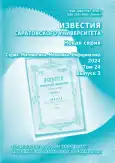A new proof of the Krzyz conjecture for n = 3
- Authors: Stupin D.L.1
-
Affiliations:
- Tver State University
- Issue: Vol 24, No 3 (2024)
- Pages: 342-350
- Section: Mathematics
- URL: https://journals.rcsi.science/1816-9791/article/view/353374
- DOI: https://doi.org/10.18500/1816-9791-2024-24-3-342-350
- EDN: https://elibrary.ru/FNMHYW
- ID: 353374
Cite item
Full Text
Abstract
The purpose of this paper is to solve the problem of the sharp estimation of the modulus of the third Taylor coefficient on the class of holomorphic bounded nonvanishing in the unit disk functions (hereafter referred to as the class of bounded nonvanishing functions). The problem of sharp estimation of the moduli of all Taylor coefficients depending on the coefficient number on this class is usually called the Krzyz problem. Consider the class of normalized holomorphic bounded functions in the unit disk (hereafter referred to as the class of bounded functions). The coefficient problem on this class is posed as follows: find the necessary and sufficient conditions to impose on a sequence of complex numbers so that the power series with coefficients from this sequence is the Taylor series of some function from the class of bounded functions. In this paper, by means of the solution of the coefficient problem for the class of bounded functions, we solve the problem of obtaining the sharp estimates of moduli of the first three Taylor coefficients on the class of bounded functions. It is pointed out that it is possible to visualize the first three coefficient bodies of the subclass of the class of bounded functions, consisting of functions with real coefficients. Next, we solve the problem of obtaining the sharp upper estimation of the modulus of the third Taylor coefficient on the class of bounded nonvanishing functions, by reducing it to the functional over the class of bounded functions. On the basis of the above-mentioned estimates on the class of bounded functions, it was possible to obtain a functional that majorizes the original one. The problem is then reduced to the problem of finding the conditional maximum of the function of three real variables with inequality-type constraints, which made it possible to apply standard methods of differential calculus to obtain this main result.
About the authors
Denis Leonidovich Stupin
Tver State University
ORCID iD: 0000-0002-9183-9543
33 Zhelyabova St., Tver 170100, Russia
References
- Krzyz J. G. Coefficient problem for bounded nonvanishing functions // Annales Polonici Mathematici. 1968. Vol. 20. P. 314.
- Samaris N. A proof of Krzyz’s conjecture for the fifth coefficient // Complex Variables, Theory and Application: An International Journal. 2003. Vol. 48, iss. 9. P. 753–766. https://doi.org/10.1080/0278107031000152616
- Rogosinski W. On the coefficients of subordinate functions // Proceedings of the London Mathematical Society. 1945. Vol. s2-48, iss. 1. P. 48–82. https://doi.org/10.1112/plms/s2-48.1.48
- Ступин Д. Л. Проблема коэффициентов для функций, отображающих круг в обобщенный круг и задача Каратеодори – Фейера // Применение функционального анализа в теории приближений. 2012. № 33. С. 45–74. EDN: QZHWUT
- Brown J. E. Iterations of functions subordinate to schlicht functions // Complex Variables, Theory and Application: An International Journal. 1987. Vol. 9, iss. 2–3. P. 143–152. https://doi.org/10.1080/17476938708814258
- Голузин Г. М. Геометрическая теория функций комплексного переменного. Москва : Наука, 1966. 628 с.
- Levin V. I. Losing der Aufgabe 163 // Jahresbericht der Deutschen Mathematiker-Vereinigung. 1934. Vol. 44. P. 80–81.
- Fenchel W. Losing der Aufgabe 163 // Jahresbericht der Deutschen Mathematiker-Vereinigung. 1934. Vol. 44. P. 81–82.
- Reissner E. Losing der Aufgabe 163 // Jahresbericht der Deutschen Mathematiker-Vereinigung. 1934. Vol. 44. P. 83.
- Hummel J. A., Scheinberg S., Zalcman L. A. A coefficient problem for bounded nonvanishing functions // Journal d’Analyse Mathematique. 1977. Vol. 31. P. 169–190. https://doi.org/10.1007/BF02813302
- Prokhorov D. V., Szynal J. Coefficient estimates for bounded nonvanishing functions // Bulletin de l’Academie Polonaise des Sciences. Serie des Sciences Mathematiques. 1981. Vol. 29, iss. 5–6. P. 223–230.
- Prokhorov D. V. Coefficients of holomorphic functions // Journal of Mathematical Sciences. 2001. Vol. 106, iss. 6. P. 3518–3544. https://doi.org/10.1023/A:1011975914158
- Szapiel W. A new approach to the Krzyz conjecture // Annales Universitatis Mariae Curie-Sklodowska, Sectio A. 1994. Vol. 48. P. 169–192.
Supplementary files










